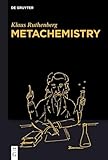Metachemistry / Klaus Ruthenberg.
Material type: TextPublisher: Berlin ; Boston : De Gruyter, [2024]Copyright date: 2024Description: 1 online resource (XII, 295 p.)Content type:
TextPublisher: Berlin ; Boston : De Gruyter, [2024]Copyright date: 2024Description: 1 online resource (XII, 295 p.)Content type: - 9783111400020
- 9783111402703
- 9783111401041
- 745.4
- online - DeGruyter
- Issued also in print.
| Item type | Current library | Call number | URL | Status | Notes | Barcode | |
|---|---|---|---|---|---|---|---|
 eBook
eBook
|
Biblioteca "Angelicum" Pont. Univ. S.Tommaso d'Aquino Nuvola online | online - DeGruyter (Browse shelf(Opens below)) | Online access | Not for loan (Accesso limitato) | Accesso per gli utenti autorizzati / Access for authorized users | (dgr)9783111401041 |
Browsing Biblioteca "Angelicum" Pont. Univ. S.Tommaso d'Aquino shelves, Shelving location: Nuvola online Close shelf browser (Hides shelf browser)

|

|

|

|

|

|

|
||
| online - DeGruyter Hypokrisie in der satirischen Literatur des Altfranzösischen : Zur Konturierung von Scheinheiligkeit im theologischen und gesellschaftlichen Diskurs / | online - DeGruyter Speaking to Job in Greek : Text, Translation Technique, Literary and Theological Profile of OG Job 38:1-42:6 / | online - DeGruyter Erfolgreich recherchieren - Jura / | online - DeGruyter Metachemistry / | online - DeGruyter Off the Beaten Path : Ovidian Journeys in Valerius Flaccus’ ›Argonautica‹ / | online - DeGruyter Konzeptionen zeitgenössischer Kunst : Zum Wandel des Kunstbegriffs seit 1900 / | online - DeGruyter Islamic Microfinance : Landscape, Models and Future Prospects / |
Frontmatter -- Preface to the German Edition -- Preface to the English Edition -- Contents -- Table of Abbreviations -- 1 Introduction – Self-Descriptions and External Assessments -- 2 The Berthelot Principle -- 3 Chemical Empiriocriticism – František Wald -- 4 Foundations of Chemistry – Ostwald’s Principles -- 5 No Analysis without Synthesis -- 6 Potentiality and Temporality -- 7 Naturally Chemical? -- 8 How Chemical Is Quantum Chemistry? -- 9 Friedrich Paneth – a Philosophizing Chemist -- 10 Ontological Underdetermination -- 11 Synopsis – Fundamentals of Metachemistry -- 12 References -- List of Figures -- Name Index -- Subject Index
restricted access online access with authorization star
http://purl.org/coar/access_right/c_16ec
Ruthenberg highlights the unique aspects of chemistry, specifically its metachemical fundamentals, which have been largely overlooked in current philosophies of science. Conventional metaphysics, derived from or focused on theoretical physics, is inadequate when applied to chemistry. The author examines and integrates historical and philosophical perspectives on important aspects of chemistry, including affinity, compositionism, emergence, synthesis/analysis, atomism/non-atomism, chemical species, chemical bond, chemical concepts, plurality, temporality/potentiality, reactivity, and underdetermination. To accomplish this, he draws on the works of notable chemists such as František Wald, Wilhelm Ostwald, Friedrich Paneth, and Hans Primas, who have contributed to the philosophical understanding of chemistry. The central conclusion of this study aligns with Immanuel Kant's viewpoint: Chemistry is a systematic art.
Issued also in print.
Mode of access: Internet via World Wide Web.
In English.
Description based on online resource; title from PDF title page (publisher's Web site, viewed 20. Nov 2024)


